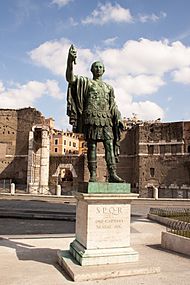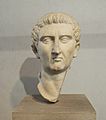Nerva facts for kids
Quick facts for kids Nerva |
|||||
|---|---|---|---|---|---|
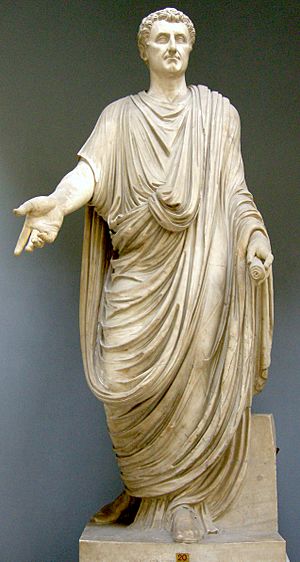 |
|||||
| Roman emperor | |||||
| Reign | 18 September 96 – 27 January 98 (16 months) |
||||
| Predecessor | Domitian | ||||
| Successor | Trajan | ||||
| Born | Marcus Cocceius Nerva 8 November 30 Narni, Italy |
||||
| Died | 27 January 98 (aged 67) Gardens of Sallust, Rome, Italy |
||||
| Burial | Mausoleum of Augustus, Rome | ||||
| Issue | Trajan (adoptive) | ||||
|
|||||
| Dynasty | Nerva–Antonine | ||||
| Father | Marcus Cocceius Nerva | ||||
| Mother | Sergia Plautilla | ||||
Nerva (/ˈnɜːrvə/), whose full name was Marcus Cocceius Nerva, was a Roman emperor who ruled from 96 to 98 AD. He became emperor when he was almost 66 years old. Before becoming emperor, Nerva had a long career serving previous emperors like Nero and the Flavian dynasty.
Under Emperor Nero, Nerva was part of the emperor's close group of advisors. He helped uncover a plot against Nero in 65 AD called the Pisonian conspiracy. Later, he was loyal to the Flavian emperors, Vespasian and Domitian. He even became a Roman consul (a high-ranking official) twice, in 71 AD and 90 AD.
On September 18, 96 AD, Emperor Domitian was killed in a palace plot. This plot involved members of the Praetorian Guard (the emperor's personal bodyguards). On the very same day, the Roman Senate declared Nerva the new emperor. As the new ruler of the Roman Empire, Nerva promised to bring back freedoms that had been limited during Domitian's strict rule.
Nerva's time as emperor was short, lasting only about 16 months. He faced money problems and found it hard to control the Roman army. In October 97 AD, the Praetorian Guard revolted. This forced Nerva to adopt an heir. After thinking it over, Nerva chose Trajan, a young and popular general, to be his successor. Nerva died naturally on January 27, 98 AD, at the age of 67. After his death, Trajan became emperor and Nerva was made a god (deified).
Even though we don't know much about Nerva's life, ancient historians thought he was a wise and fair emperor. His greatest achievement was making sure there was a peaceful transition of power after he died. By choosing Trajan, he started the Nerva–Antonine dynasty. He is known as the first of the Five Good Emperors.
Contents
Nerva's Early Life and Career
Growing Up in Rome
Marcus Cocceius Nerva was born in a village called Narni, about 50 kilometers north of Rome. His father, also named Marcus Cocceius Nerva, was a Roman consul during the time of Emperor Caligula (37–41 AD). His mother was Sergia Plautilla. Nerva was born on November 8, but historians disagree if it was in 30 AD or 35 AD.
Nerva came from a respected and important political family in Rome. His family had held consulships for many generations. This meant they were well-connected in the Roman government.
Serving the Emperors
We don't know much about Nerva's early career. He didn't follow the usual path of military service. Instead, he became known as a skilled diplomat and advisor. In 65 AD, he was a praetor (a high-ranking Roman official).
As an advisor to Emperor Nero, Nerva helped uncover a major plot against the emperor. His help was so important that he received special honors, usually given for military victories. His statues were even placed in the palace. The poet Martial praised Nerva's writing skills, calling him the "Tibullus of our time."
After Nero's death in 68 AD, Rome went through a chaotic period with four different emperors in one year. Nerva supported Vespasian, who eventually became emperor. For his support, Nerva was made a consul in 71 AD. This was a great honor, especially since he wasn't part of the emperor's direct family.
Nerva continued to serve as an advisor under Vespasian and his sons, Titus and Domitian. In 89 AD, he helped Domitian during a revolt led by a governor named Lucius Antonius Saturninus. Nerva's role in stopping this rebellion earned him another consulship with Domitian in 90 AD. This showed that Nerva was a trusted and loyal official.
Nerva Becomes Emperor
How Nerva Rose to Power
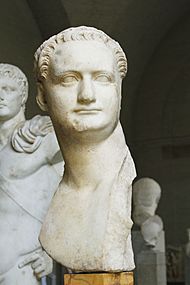
On September 18, 96 AD, Emperor Domitian was killed by people in his own palace. On the same day, the Roman Senate quickly declared Nerva the new emperor. This was a big moment because it was the first time the Senate actually chose an emperor on its own. Usually, the army or the previous emperor made the choice.
Nerva was an unusual choice because he was old and didn't have any children. He had also spent much of his career away from the public eye. Some historians think he might have known about the plot against Domitian, but he probably wasn't directly involved. His lack of involvement made him acceptable to different groups in Rome.
Historians believe the Senate chose Nerva quickly to prevent a civil war. Nerva accepted the role to avoid chaos. After he became emperor, the Senate decided to erase Domitian's memory. This was called damnatio memoriae. Domitian's statues were melted down, his arches were torn down, and his name was removed from public records. Nerva even moved into a different villa, away from Domitian's grand palace.
Nerva's Rule and Reforms
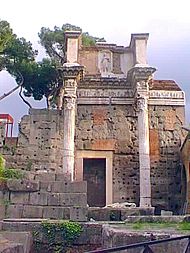
Senators were especially happy with the change in leadership because Domitian had treated them harshly. Nerva promised that no senators would be put to death during his rule. He stopped trials for treason and released people who had been imprisoned or exiled. He also returned property that Domitian had taken from families. Nerva tried to involve the Senate more in his government.
To gain support from the Roman people, Nerva gave gifts and money. Citizens received 75 denarii each, and soldiers of the Praetorian Guard received a large payment of up to 5000 denarii.
Nerva also introduced economic reforms to help the poor. He gave land to the poorest Romans. He removed a 5% inheritance tax for parents and their children. He also offered loans to Italian landowners. The interest from these loans would help support children from needy families. This idea was later expanded by other emperors. Nerva also reduced many taxes and gave special benefits to Roman provinces. He stopped unfair practices related to the Fiscus Judaicus, which was a special tax on Jews.
Nerva's spending soon put a strain on Rome's finances. He had to create a special group to cut down on expenses. They stopped unnecessary religious sacrifices, games, and horse races. They also raised money by selling off Domitian's old belongings. Nerva even forbade people from making gold and silver statues in his honor.
Because his reign was short, Nerva didn't build many new public works. Instead, he finished projects started by the Flavian emperors. He repaired Roman roads and expanded the aqueducts (water supply systems). The only major new buildings under Nerva were a granary and the Forum of Nerva. This forum was started by Domitian and connected other important forums in Rome.
Challenges and Choosing an Heir
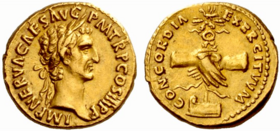
Even with Nerva's efforts to be popular, many in the Roman army still supported Domitian. The Praetorian Guard, in particular, wanted Domitian's killers punished. Nerva had replaced their leader, but they were still unhappy.
Nerva's position as emperor was not very strong. He was kind but sometimes struggled to show his authority. He stopped treason trials but allowed senators to go after people who had informed on others during Domitian's rule. This led to some confusion and personal revenge.
In early 97 AD, a plot against Nerva by a senator failed. But Nerva refused to put the plotters to death, which upset the Senate.
The biggest problem was that Nerva was old and sick, and he had no children to take over. He needed to choose a successor from among the Roman generals or governors. In October 97 AD, the Praetorian Guard, led by Casperius Aelianus, surrounded the Imperial Palace and took Nerva hostage. They forced him to agree to their demands, including handing over those responsible for Domitian's death. Nerva even had to give a speech thanking the rebellious guards.
After this, Nerva's authority was severely damaged. He realized he needed the support of an heir who was approved by both the army and the people. Soon after, he announced that he was adopting Trajan as his successor. This decision meant Nerva was essentially giving up his power. Trajan was a popular general who commanded armies on the German border.
Historians believe Nerva had little choice but to adopt Trajan. He needed a strong leader to restore stability. This adoption is often seen as the start of a tradition where emperors chose their successors based on merit, not just family ties.
Nerva's Death and Lasting Impact
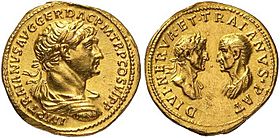
On January 1, 98 AD, Nerva suffered a stroke. He then got a fever and died on January 27 at his villa in the Gardens of Sallust. The Senate declared him a god, and his ashes were placed in the Mausoleum of Augustus. He was the last Roman emperor to be buried there.
His adopted son, Trajan, became emperor without any problems. The Roman people welcomed Trajan with great excitement.
Because there are not many written records from this time, much of Nerva's life remains a mystery. The most detailed account of his reign comes from the historian Cassius Dio, who wrote about 100 years after Nerva died. Other details come from shorter biographies.
The historian Tacitus, who lived at the same time as Nerva, spoke highly of him. Tacitus described Nerva's reign as "the dawn of a most happy age," where Nerva brought together "sovereignty and freedom." Both Cassius Dio and Aurelius Victor praised Nerva's wisdom and fairness.
Later, in the 18th century, the historian Edward Gibbon called Nerva the first of the Nerva–Antonine dynasty#Five Good Emperors. Gibbon believed these five emperors ruled Rome with "wisdom and virtue."
Modern historians see Nerva as a well-meaning but somewhat weak ruler. The Roman Senate gained more freedom under him. However, Nerva's money problems and his difficulty controlling the army almost led to a big crisis. The mutiny by the Praetorian Guard showed how vulnerable he was. Adopting Trajan helped Nerva gain the support he needed.
Nerva's place in Roman history is often seen as a necessary step before the strong rule of Trajan and the emperors who followed him. Even the main public building completed during his reign, the Forum of Nerva, became known as the Forum Transitorium, or "transitional forum."
Two modern statues honor Nerva today. There is an equestrian (on horseback) statue in Gloucester, England, a town founded in his honor. There is also a statue in his alleged birthplace, Narni, Italy.
Images for kids
-
Nerva as Jupiter; cast of a sculpture in the Capitoline Museums (Pushkin Museum, Moscow).
-
Bust of Nerva in the Roman-Germanic Museum of Cologne, Germany
Nerva–Antonine family tree
|
|||||||||||||||||||||||||||||||||||||||||||||||||||||||||||||||||||||||||||||||||||||||||||||||||||||||||||||||||||||||||||||||||||||||||||||||||||||||||||||||||||||||||||||||||||||||||||||||||||||||||||||||||||||||||||||||||||||||||||||||||||||||||||||||||||||||||||||||||||||||||||||||||||||||||||||||||||||||||||||||||||||||||||||||||||||||||||||||||||||||||||||||||||||||||||||||||||||||||||||||||||||||||||||||||||||||||||||||||||||||||||||||||||||||||||||||||||||||||||||||||||||||||||||||||||||||||||||||||||||||||||||||||||||||||||||||||||||||||||||||||||||||||||||||||||||||||||||||||||||||||||||||||||||||||||||||||||||||||||||||||||||||||||||||||||||||||||||||||||||||||||||||||||||||||||||||||||||||||||||||||||||||||||||||||||||||||||||||||||||||||||||||||||||||||||||||||||||||||||||||||||||||||||||||||||||||||||||||||||||||||||||||||||||||||||||||||||||||||||||||||||||||||||||||||||||||||||||||||||||||||||||||||||||||||||||||||||||||||||||||||||||||||||||||||||||||||||||||||||||||
|
|||||||||||||||||||||||||||||||||||||||||||||||||||||||||||||||||||||||||||||||||||||||||||||||||||||||||||||||||||||||||||||||||||||||||||||||||||||||||||||||||||||||||||||||||||||||||||||||||||||||||||||||||||||||||||||||||||||||||||||||||||||||||||||||||||||||||||||||||||||||||||||||||||||||||||||||||||||||||||||||||||||||||||||||||||||||||||||||||||||||||||||||||||||||||||||||||||||||||||||||||||||||||||||||||||||||||||||||||||||||||||||||||||||||||||||||||||||||||||||||||||||||||||||||||||||||||||||||||||||||||||||||||||||||||||||||||||||||||||||||||||||||||||||||||||||||||||||||||||||||||||||||||||||||||||||||||||||||||||||||||||||||||||||||||||||||||||||||||||||||||||||||||||||||||||||||||||||||||||||||||||||||||||||||||||||||||||||||||||||||||||||||||||||||||||||||||||||||||||||||||||||||||||||||||||||||||||||||||||||||||||||||||||||||||||||||||||||||||||||||||||||||||||||||||||||||||||||||||||||||||||||||||||||||||||||||||||||||||||||||||||||||||||||||||||||||||||||||||||||||
| Notes:
Except where otherwise noted, the notes below indicate that an individual's parentage is as shown in the above family tree. |
|||||||||||||||||||||||||||||||||||||||||||||||||||||||||||||||||||||||||||||||||||||||||||||||||||||||||||||||||||||||||||||||||||||||||||||||||||||||||||||||||||||||||||||||||||||||||||||||||||||||||||||||||||||||||||||||||||||||||||||||||||||||||||||||||||||||||||||||||||||||||||||||||||||||||||||||||||||||||||||||||||||||||||||||||||||||||||||||||||||||||||||||||||||||||||||||||||||||||||||||||||||||||||||||||||||||||||||||||||||||||||||||||||||||||||||||||||||||||||||||||||||||||||||||||||||||||||||||||||||||||||||||||||||||||||||||||||||||||||||||||||||||||||||||||||||||||||||||||||||||||||||||||||||||||||||||||||||||||||||||||||||||||||||||||||||||||||||||||||||||||||||||||||||||||||||||||||||||||||||||||||||||||||||||||||||||||||||||||||||||||||||||||||||||||||||||||||||||||||||||||||||||||||||||||||||||||||||||||||||||||||||||||||||||||||||||||||||||||||||||||||||||||||||||||||||||||||||||||||||||||||||||||||||||||||||||||||||||||||||||||||||||||||||||||||||||||||||||||||||||
References:
|
|||||||||||||||||||||||||||||||||||||||||||||||||||||||||||||||||||||||||||||||||||||||||||||||||||||||||||||||||||||||||||||||||||||||||||||||||||||||||||||||||||||||||||||||||||||||||||||||||||||||||||||||||||||||||||||||||||||||||||||||||||||||||||||||||||||||||||||||||||||||||||||||||||||||||||||||||||||||||||||||||||||||||||||||||||||||||||||||||||||||||||||||||||||||||||||||||||||||||||||||||||||||||||||||||||||||||||||||||||||||||||||||||||||||||||||||||||||||||||||||||||||||||||||||||||||||||||||||||||||||||||||||||||||||||||||||||||||||||||||||||||||||||||||||||||||||||||||||||||||||||||||||||||||||||||||||||||||||||||||||||||||||||||||||||||||||||||||||||||||||||||||||||||||||||||||||||||||||||||||||||||||||||||||||||||||||||||||||||||||||||||||||||||||||||||||||||||||||||||||||||||||||||||||||||||||||||||||||||||||||||||||||||||||||||||||||||||||||||||||||||||||||||||||||||||||||||||||||||||||||||||||||||||||||||||||||||||||||||||||||||||||||||||||||||||||||||||||||||||||||
See Also
 In Spanish: Nerva para niños
In Spanish: Nerva para niños
 | May Edward Chinn |
 | Rebecca Cole |
 | Alexa Canady |
 | Dorothy Lavinia Brown |


